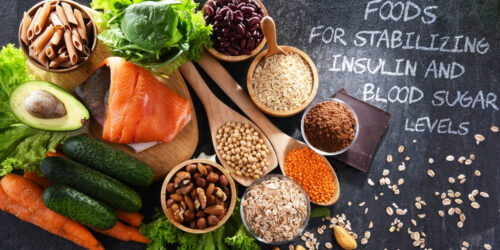Top 10 Stress-Reducing Foods: A Holistic Approach

In today’s fast-paced world, stress is an ever-present challenge for many. Thankfully, nature has provided us with an array of stress-reducing foods that can help promote a sense of calm and well-being. This holistic approach to combating stress through nutrition is not only effective, but also delicious! Let’s explore the top 10 stress-reducing foods and discover how they can contribute to a healthier, more balanced life.
Dark Chocolate

Indulge in a square of dark chocolate, and you might just find your stress dissolving with each bite. This tasty treat isn’t just a guilty pleasure; it’s loaded with cocoa content that has been linked to lower stress levels. With its rich supply of antioxidants, dark chocolate not only pleases your taste buds but can also lift your mood, making it a sweet addition to your stress-busting arsenal.
Cocoa Content and Stress Reduction
Indulging in dark chocolate isn’t just a treat for your taste buds; it can also help take the edge off your stress levels. Dark chocolate is rich in cocoa, which contains compounds known to enhance mood and alleviate tension. Research suggests that a moderate amount of dark chocolate with high cocoa content may lower levels of stress hormones, such as cortisol and catecholamines in the body, making it a delightful ally in your quest for calm.
Furthermore, cocoa boosts the brain’s production of endorphins and serotonin, neurotransmitters that create feelings of happiness and well-being. Just be sure to choose dark chocolate with a high percentage of cocoa—usually above 70%—to reap these stress-busting benefits. Not only will you satisfy your sweet tooth, but you’ll also be giving your mental health a boost!
Antioxidants and Mood Enhancement
Eating your way to a better mood might sound like a dream, but it’s a reality with foods rich in antioxidants. These natural compounds don’t just battle it out with harmful free radicals in your body; they also have a secret weapon – mood enhancement. Regular consumption of foods high in antioxidants, like dark chocolate, has been linked to lower rates of depression and can help in managing stress levels.
That feeling of happiness after eating dark chocolate isn’t just in your head. It’s actually backed by science! The antioxidants in dark chocolate, especially flavonoids, promote brain health by improving blood flow to the brain and aiding in the production of feel-good brain chemicals like endorphins and serotonin. So, when you’re feeling down, a small piece of dark chocolate might be just what you need to give your mood a little boost. Just remember, moderation is key!
Avocado

When it comes to calming foods, avocados are like a soothing hug for your brain. Rich in healthy fats and loaded with stress-crushing nutrients, these creamy green gems are more than just great for guacamole. Dive into the avocado’s superpowers, and you’ll understand why they’re an all-star player in the quest for zen.
Healthy Fats and Brain Function
Did you know that your brain is kind of like a high-performance car? It needs premium fuel to run at its best. And by ‘premium fuel,’ we’re talking about healthy fats. These aren’t just any fats, though. They’re the good guys that your brain loves, specifically the monounsaturated fats found in avocados.
These fats help to keep your brain cells flexible and responsive. It’s like they’re keeping the communication lines between your brain cells slick and speedy. Monounsaturated fats also help with blood flow—the more blood that gets to your brain, the better it can function. So, when you munch on an avocado, you’re not just treating your taste buds, you’re giving your brain a boost too!
Potassium and Blood Pressure Regulation
Potassium is a super important mineral for our bodies, especially when it comes to keeping our blood pressure in check. Avocados, yup, those creamy green fruits (or veggies, depending on who you ask!) are like the jackpot of potassium. In fact, they’ve got more potassium than bananas, which most people think of first for this nutrient.
When you get enough potassium in your diet, it helps to balance out the salt in your system. This balance is key because too much salt can make your blood pressure go up, which is stressful on your heart. Picture potassium as the chill friend who keeps things cool when salt starts to party too hard. By including potassium-rich foods, like those tasty avocados, in your meals, you’re helping to ensure that your heart doesn’t have to work overtime, reducing one of the stress factors in your body’s daily grind.
Blueberries

Munch on a handful of blueberries, and not only are you getting a sweet treat, but you’re also giving your body a stress-busting boost! These little blue gems are packed with antioxidants, which help your body deal with stress more effectively. Plus, they’re a great source of Vitamin C, which supports your immune system when you’re feeling the pressure. So, when life starts getting a bit too busy, remember that blueberries might just be your tasty little stress relief allies.
Antioxidant Properties for Stress Relief
Blueberries are tiny but mighty when it comes to battling stress. Packed with antioxidants, these little blue gems help your body handle stress more effectively. Antioxidants work by neutralizing free radicals, which are unstable molecules that can cause damage to your cells. This damage can lead to stress and various health issues.
The antioxidants in blueberries, particularly flavonoids, have a significant impact on reducing stress. They help regulate mood and improve your body’s response to stress. Eating blueberries can be a sweet way to calm your mind and keep your body feeling great. Plus, they’re easy to add to your diet – just toss them in a smoothie or sprinkle them over your breakfast cereal!
Vitamin C and Immune Support
When it comes to boosting your immune system, Vitamin C is like a superhero. This powerful nutrient is well-known for its role in helping our bodies stay strong and ready to fight off stress. Found in generous quantities in blueberries, it’s more than just a guard against the common cold; it’s a stress-busting ally.
This mighty vitamin also does a stellar job at keeping our stress hormones, like cortisol, in check, helping you stay cool and collected. So, munch on some blueberries to give your body a fighting chance against both stress and germs!
Green Tea

Imagine sitting back and sipping on a warm, soothing cup of green tea, feeling the day’s tension melt away. Green tea is more than just a comforting beverage; it’s loaded with compounds that can help your mind and body relax. The benefits of green tea reach deep, offering a blend of amino acids and antioxidants that work together to keep you feeling calm and collected. As we delve into the specifics, you’ll see why this timeless drink is just what you might need when stress tries to get the upper hand.
Theanine and Relaxation
Sipping a cup of green tea might do more than just soothe your soul. This ancient brew contains a magical ingredient called L-Theanine. This amino acid is practically a superhero when it comes to relaxation. L-Theanine has the power to calm your mind without making you drowsy. It does this cool trick by increasing the levels of gamma-aminobutyric acid (GABA) in your brain. GABA’s job is to put a damper on all those stress signals zipping around in your head.
Studies have backed up this calming effect, too. They suggest that L-Theanine promotes an increase in alpha wave activity in the brain. Now, in simpler terms, that means your brain is entering a state of chill without flipping the off switch on alertness. It’s like having the calm focus of a yoga guru, right in your teacup. So next time life throws a curveball your way, remember that a mug of green tea might just be the zen you’re searching for.
Epigallocatechin Gallate (EGCG) and Stress Management
You might not be able to say “Epigallocatechin Gallate” five times fast, but this awesome compound can fast-track your way to less stress. Found in the leaves of green tea, EGCG is a type of catechin, which is basically a fancy word for a powerful antioxidant. These antioxidants do a stellar job at fighting off the physical effects of stress in the body.
And here’s the cool part: EGCG is like a chill pill for your cells. It’s been studied for its potential to help your brain manage the biochemical reactions that occur when you’re stressed out. So when life’s hectics are brewing, a cup of green tea could be just what you need to keep those stress waves at bay. Whether it’s a tough day at school, or your to-do list is a mile long, sipping on some green tea might help you stay on top of your game without feeling frazzled.
Oatmeal

Starting your day with a warm and comforting bowl of oatmeal is not only a classic breakfast choice but also a fantastic way to ease stress. This simple grain is packed with complex carbohydrates that help to produce serotonin, a chemical in your brain that boosts your mood and creates a calming effect. Plus, oatmeal comes with magnesium which can help your muscles relax, truly making it a double-duty stress buster.
Complex Carbohydrates and Serotonin Production
When we’re feeling overwhelmed or under pressure, reaching for a bowl of warm oatmeal might be more beneficial than we think. Complex carbohydrates are power players in the game of stress reduction. They aid in the production of serotonin, a feel-good chemical in our brain that promotes relaxation and a positive mood.
But how exactly does this work? Consuming complex carbs like oatmeal triggers the body to release insulin, which allows tryptophan, an amino acid, to enter the brain more easily. Since tryptophan is a precursor to serotonin, this process can help boost your mood and create a feeling of calm. So, swapping out sugary snacks for whole grain goodness not only nourishes your body but also your mental state.
Magnesium for Muscle Relaxation
Need to unwind your muscles and chill out after a long day? Magnesium might just be what you’re looking for. This magical mineral plays a huge part in relaxing our muscles, keeping things running smoothly. When we’re low on magnesium, our body sends out the stress signal loud and clear, making muscles tense up.
Taking in foods rich in magnesium, like oatmeal, spinach, or even some tasty dark chocolate, can help ease those tight muscles. It’s like giving your body a mini spa treatment from the inside out! So yes, go ahead and enjoy that oatmeal for breakfast or a handful of spinach in your smoothie – your muscles will thank you.
Walnuts

Walnuts are not just a crunchy treat but also a mighty ally in your fight against stress. Packed with Omega-3 fatty acids, these little brain-shaped nuts help to decrease the stress hormone levels in your body. They offer a satisfying combination of protein and healthy fats, keeping you full and focused, which can really keep the stress at bay. Plus, the satisfying crunch can ACT as a stress reliever in itself—ever notice how biting down on something crunchy just eases your tension? Grab a handful of walnuts, and you might just crunch your way to calmness.
Omega-3 Fatty Acids and Stress Reduction
Omega-3 fatty acids are like the superheroes of the nutritional world, especially when it comes to fighting off the stress monsters. These essential fats are found in foods such as fish, walnuts, and flaxseeds and are not just good for your heart – they’re awesome for your brain too! Research has shown that omega-3s help reduce the levels of stress hormones, like cortisol and adrenaline, making it easier for you to chill out after a tense day.
Here’s the cool part: omega-3s actually play a role in improving your mood. They are crucial components of brain cell membranes, and their presence helps to enhance communication between brain cells. This can lead to a more stable mood and a decrease in stress levels. So, adding a handful of walnuts to your snack routine or enjoying a nice salmon dinner can actually help you stay calm and collected. Isn’t it amazing how a bit of tweaking in our diet can make stress wave the white flag?
Protein and Satiety
Feeling full and satisfied after a meal is super important when you’re trying to keep stress at bay. Walnuts are not just a crunchy treat; they’re packed with protein that can help you feel full longer. Protein takes more time for your body to break down, so it stays in your tummy longer. This means you’re less likely to get hangry and more likely to stay calm and focused.
Adding walnuts to your diet is a great way to help manage those hunger pangs that can lead to stress. The protein in walnuts helps regulate hunger hormones like ghrelin and leptin, which can make you feel more satisfied and less stressed about when you’ll eat next. It’s kind of like having a chill pill tucked away in every bite!
Oranges

Let’s peel back some of the benefits of this vibrant citrus fruit, oranges! They’re like a burst of sunshine for your body, serving up a juicy combo of Vitamin C and fiber. These components play a crucial part in chilling out those stress levels and keeping your digestive system on the happy track. Who knew that something as simple as an orange could have you feeling more relaxed?
Vitamin C and Cortisol Regulation
When life gives you lemons—or oranges— it’s not just about making lemonade. It turns out that these citrus wonders are packed with Vitamin C, which is a real superhero when it comes to beating stress. This essential nutrient not only supports your immune system but also plays a key role in cortisol regulation.
Cortisol, often called the ‘stress hormone’, can go into overdrive when we’re faced with stressful situations. But, having plenty of Vitamin C in your diet helps keep this hormone in check, ensuring your stress levels don’t hit the roof. So, next time you feel the pressure piling up, reaching for an orange could be a sweet and simple way to help you stay calm and carry on.
Fiber Content and Digestive Health
When you’re feeling frazzled, your digestive health may not be your top priority. But did you know the two are closely connected? Foods rich in fiber can play a key role in maintaining a calm digestive system, which in turn can help manage stress levels. Take oranges, for example. Not only are they juicy and delicious, but they’re also packed with fiber.
This special nutrient helps keep things moving smoothly in your gut. When your gut is happy and functioning properly, it’s easier for your body to handle stress. Imagine fiber as your digestive tract’s helper, sweeping through and cleaning up so you can feel more relaxed. Plus, a healthy gut means better absorption of nutrients, which your body needs to combat stress. So, next time you’re feeling tense, reaching for a piece of fruit like an orange could be a sweet and smart way to help you unwind.
Spinach

Spinach isn’t just good for building muscles like a certain famous sailor; it’s also a powerhouse when it comes to squashing stress. Rich in iron and folate, spinach helps to keep your energy levels high and your mood balanced. The nutrients in these green leaves can assist the body in various ways, including producing energy and managing mood swings. So next time you’re feeling a bit frazzled, consider reaching for a spinach salad or tossing some leaves into your favorite shake.
Iron for Energy Production
Iron is like your body’s personal power plant. When you get enough iron through foods like spinach, it helps to produce energy in a big way. This is because iron is a key player in creating hemoglobin, the stuff in your red blood cells that carries oxygen throughout your body. With more oxygen, your cells can churn out energy more efficiently, keeping you feeling alive and kicking instead of tired and stressed.
But here’s the superhero twist: when your energy levels are up, you’re better equipped to handle stress. Studies have found that when people are iron-deficient, they can feel more fatigued, and this drop in energy can crank up stress levels. So, munching on iron-rich foods isn’t just a boost for your muscles; it’s also a way to help your mind stay cool under pressure.
Folate and Mood Regulation
Folate, also known as vitamin B9, plays a crucial role in our brain’s feel-good chemistry. It’s essential for creating neurotransmitters that regulate mood, like serotonin, dopamine, and norepinephrine. When your levels of folate are up, your brain is more likely to produce a steady flow of these mood-boosting chemicals. This means you might feel more relaxed and happier.
Low folate levels have been linked to a tough time dealing with stress and can even contribute to depression. By munching on folate-rich foods like spinach, you’re not just having a tasty green; you’re helping your brain help you stay calm and collected. It’s like a natural chill pill on your plate!
Salmon

Dive into the world of omega-3s with salmon, a powerhouse fish that’s like a spa treatment for your brain. Not only is it packed with nutrients that support overall brain health, but it’s also been linked to enhancing your mood and warding off the blues. Plus, it comes with a bonus dose of Vitamin D, which can be a game-changer during those gloomy winter months when sunshine is scarce.
Omega-3 Fatty Acids and Brain Health
Omega-3 fatty acids are like the ninjas of the nutritional world – silently but powerfully supporting your brain. These essential fats are key players in maintaining healthy brain cells and promoting optimal brain function. But that’s not all. Omega-3s are also instrumental in reducing inflammation, which can impact your brain in a negative way if left unchecked.
Fish like salmon are swimming with these beneficial fats. By regularly including them in your meals, you could be giving your brain a big high-five. Not to mention, scientists have linked omega-3 intake with a lift in mood and a decrease in the rates of depression. So, not only can these fats help keep your brain feeling good, but they might also make you happier!
Vitamin D and Emotional Well-Being
Did you know that the “sunshine vitamin”, better known as Vitamin D, plays a key role in our emotional health? It’s true! This vital nutrient helps maintain brain function, and a lack of it is often linked to mood swings and increased stress levels. Getting enough Vitamin D can support your emotional well-being, making you feel more balanced and calm, even on those rough days.
One fantastic source of Vitamin D is salmon. Not only is it tasty, but it also nourishes your brain with the good stuff it needs to keep you feeling emotionally resilient. Think of it like a sunny day for your mood—salmon could be the meal that helps turn a frown upside down! So next time you’re feeling a bit down, consider adding some salmon to your plate; your brain might just thank you with a burst of feel-good vibes.
Greek Yogurt

Greek yogurt is more than just a tasty snack; it’s a powerhouse when it comes to combating stress. Packed with probiotics, these good bacteria support your gut health, which is crucial for your overall mood and stress levels. Plus, the rich calcium content in Greek yogurt helps manage the body’s stress response, promoting relaxation and a sense of calm. If you’re looking for a creamy treat that doubles as a stress-buster, Greek yogurt is the way to go!
Probiotics and Gut Health
Did you know that your gut is often called your “second brain”? That’s because it’s full of nerves and bacteria that can have a big impact on your mood and stress levels. Probiotics are the good bacteria that live in your yogurt and other fermented foods, and they’re superstars when it comes to keeping your gut health in check.
They do an awesome job helping with digestion, but that’s not all! Probiotics also play a role in managing your body’s stress response. When you eat foods packed with probiotics, like Greek yogurt, you’re sending in a team of helpers to calm the chaos in your gut. And a happier gut means a more relaxed you. So, next time you’re feeling the pressure, grab a spoonful of probiotic-rich yogurt and show your gut some love. It might just help soothe your stressed-out mind!
Calcium and Relaxation
Ever notice how a warm glass of milk is often the go-to for a restful night’s sleep? That’s partly because milk is a good source of calcium, and this mineral is not just essential for strong bones—it plays a soothing role in relaxation too. Calcium helps our muscles contract and relax and also aids in the function of our nervous system.
Lack of calcium can lead to heightened stress levels and anxiety. Inadequate calcium levels may cause our nervous system to produce more stress-inducing chemicals. To keep everything running smoothly, make sure to include calcium-rich foods in your diet, like dairy products, leafy greens, and certain types of fish. With the right amount of calcium, your body is equipped to tackle stress with a calmer, more centered approach.
Conclusion
By incorporating these stress-reducing foods into your diet, you can take a holistic approach to managing and reducing stress. The power of nutrition extends far beyond mere nourishment, offering a natural and enjoyable way to cultivate a sense of balance and calm amid life’s daily demands. Embrace the abundance of stress-reducing foods and savor both their flavors and their calming effects as you elevate your well-being.
External Links on Stress-Reducing Foods:
- WebMD – Diet for Stress Management: Carbs, Nuts, and Other Stress-Relief Foods: This article discusses how diet can play a role in stress management and provides specific recommendations for stress-reducing foods, including omega-3 fatty acids, nuts, and complex carbohydrates. https://www.webmd.com/diet/ss/slideshow-diet-for-stress-management
- Cleveland Clinic – Eat These Foods to Reduce Stress and Anxiety: This resource highlights the link between the Mediterranean diet and stress reduction, emphasizing the importance of fruits, vegetables, fish, and whole grains. It also mentions the benefits of gut-healthy foods like yogurt and kimchi. https://my.clevelandclinic.org/health/treatments/6409-stress-management-and-emotional-health
- Healthline – 18 of the Best Stress-Relieving Foods: This comprehensive article lists 18 specific food choices that can help combat stress, including fatty fish, sunflower seeds, dark chocolate, and berries. It provides brief explanations of the stress-reducing nutrients found in each food. https://www.healthline.com/nutrition/stress-relieving-foods
- Everyday Health – The 10 Best Foods to Help Fight Stress: This article offers a concise overview of 10 key stress-reducing foods, including citrus fruits, almonds, and chamomile tea. It focuses on how these foods can help manage cortisol levels and improve mood. https://briefandbalanced.com/10-everyday-foods-that-reduce-stress/








Your point of view caught my eye and was very interesting. Thanks. I have a question for you.
Your point of view caught my eye and was very interesting. Thanks. I have a question for you.
Your point of view caught my eye and was very interesting. Thanks. I have a question for you.